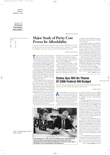Insurance status of patients with depression is associated with severity of illness, demographic factors, and location of care, according to preliminary data from the STAR*D clinical trial.
Patients without insurance or with public insurance had significantly worse depression, of longer duration, with more prior suicide attempts, worse quality of life, and worse functional status than patients with private insurance, wrote Ira M. Lesser, M.D., and eight colleagues in the August issue of the APA journal Psychiatric Services.
The goal of STAR*D—which stands for Sequenced Treatment Alternatives to Relieve Depression—is to explore which treatments work best for patients with nonpsychotic major depressive disorder when initial antidepressant treatment does not lead to an acceptable response. Participants are first given citalopram, an SSRI medication; if symptoms remain after eight to 12 weeks of treatment, up to four other levels of treatment are offered, including cognitive therapy and other medications. The study has about 4,000 participants and will conclude in September 2006.
The study by the Lesser team examined data from the first 1,500 patients with major depressive disorder who were entered into STAR*D. Valid insurance data were available for 1,452 patients. This study was intended to generate hypotheses for the full study, said the authors.
Participants were drawn from 14 study sites providing primary or psychiatric care in private, public, or Veterans Affairs facilities. About 56 percent of the patients had private insurance, 12 percent had public insurance, and 31 percent had no insurance. About 76 percent were white, 18 percent African American, and 9 percent Hispanic.
“Patients with public insurance and those with no insurance had more severe depression, a longer duration of current depression, more previous suicide attempts, self-reported poorer quality of life, and worse functional status than patients with private insurance,” wrote the authors.
Duration of the current depressive episode was longest for patients on public insurance (32.3 months), briefest for those with private insurance (16.8 months), and intermediate for those with no insurance (24.9 months). Moreover, persons with public insurance had more medical comorbidities than those with private insurance.
After adjustment, the researchers found that African Americans made up a larger percentage of the publicly insured (29 percent) and the uninsured (21 percent) than the privately insured (14 percent). Hispanic patients were also slightly overrepresented in the publicly insured and uninsured and underrepresented among the privately insured. Patients with no insurance had less education than those with private insurance, while those with public insurance had the least education. Lower socioeconomic status was also correlated with more severe depression, medical status, and quality of life.
Fewer patients with public insurance received specialty care, compared with those with private or no insurance, who were more frequently treated in primary care settings.
While the uninsured accounted for only 17 percent of patients seen in primary care, they were the most psychiatrically impaired.
“These initial findings showing privately insured depressed patients had higher rates of utilizing specialty mental health care are consistent with one of [APIRE's] national studies indicating Medicaid and Medicare patients appear to have more limited access to care from psychiatrists compared with privately insured patients,” commented Joyce C. West, Ph.D., M.P.P., director of the Practice Research Network at American Psychiatric Institute for Research and Education (APIRE). Other practice-based research by APIRE, not connected to STAR*D, has highlighted treatment-access problems and limited-treatment capacity in the public sector, she added.
Many questions remain until treatment outcomes of the patients in the full trial can be assessed, said the authors. A crucial one is whether patients with public or no insurance will respond similarly or not as well to adequate antidepressant treatment as patients with private insurance. This preliminary study was also limited because it was not drawn from a random sample and combined all Medicaid and Medicare patients into one group due to limited sample sizes.
“STAR*D is truly a landmark study,” said West. “It's the nation's first, large-scale national study designed to provide more generalizable and valid data on the effectiveness of treatments for depressed patients who initially do not respond to [an antidepressant]. It will be exciting to see the clinical outcomes of treatments for the various patient subgroups of interest—including patients with different sources of insurance and varying levels of clinical severity and complexity as outlined in this paper.”
The study by Lesser and his team was funded by the National Institute of Mental Health.
